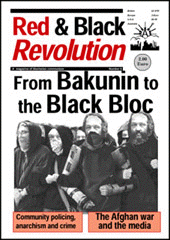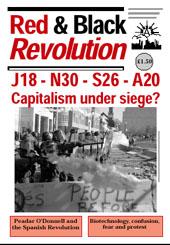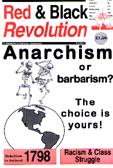

Some opening
comments
Welcome to the sixth issue
Crime and community
policing
The term 'community policing' has been much abused in recent times,
most particularly in the North of Ireland where it has become
shorthand for vicious punishment beatings and shootings. In this
article Gregor Kerr takes a look at the issue of community policing -
what it is and more importantly what it isn't. The question of what
levels of real community policing would actually be possible or
allowed under capitalism is looked at, and the debate about crime,
anti-social behaviour and reactions to it in an anarchist society is
touched on.
Bakunin's ideas on
revolutionary organisation
The Russian revolutionary Micheal Bakunin is often presented as the
'founding father' of anarchism. He was a larger than life figure
whose disputes with Marx in the 1st international form an essential
role in the clarification of the role of the vanguard and of the
state in the revolutionary process. Yet his concrete ideas on
anarchist organisation are not so well knowm. Andrew Flood takes a
closer look at them.
Bashing the Black
Bloc?
In the wake of the G8 protests in Genoa, Ray Cunningham, who took
part in the demonstrations there, looks at the future for the Black
Bloc and the 'anti-globalisation' movement.
Max
Stirner
Max Stirner was an obscure prophet of individualism living in
nineteenth century Germany. many anarchists today including anarcho
communists also consider themselves Stirnerists and a Stirnerist
tradition lives on in places like Glasgow. Conor Mc Loughlin examines
some of Stirner's ideas.
The media and the
war
Terry Clancy, of the Free Earth website, examines the 'free' press to
find out why we shouldn't expect them to provide neutral or impartial
coverage, especially during a war.
|
 |
It is nearly two years since the last edition of RBR, and although the delay has been longer than anticipated, the fact is that a number of important changes have taken place within the WSM
Over the past few years developments in biotechnology such as cloning and genetic modification of food have led to wide scale confusion, fear and protest. In this article Conor Mc Loughlin explains some of these technologies and asks are they safe? Have they any benefits? Should they be rejected or could they be used for the benefit of an anarchist society
Donal Ó Drisceoil, historian and author of a forthcoming biography of Peadar O'Donnell, looks at Salud! An Irishman in Spain, a little known account by O'Donnell of his encounter with the revolution in Spain in 1936..
Anarchism is the only political movement which consistently urges a boycott of parliamentary elections, and which refuses to partake in the sham of parliamentary 'democracy'. Too often the anarchist argument on elections is written off as just a fad or an attempt to 'appear' radical. In this article Gregor Kerr looks at the concrete political arguments behind the slogan 'If elections changed anything, they'd make them illegal'.
The publication of No Logo was perfectly, if unintentionally, timed. Just as the N30 demonstrations in Seattle made headlines around the world, No Logo arrived to explain some of the reasons for that movement [This article in Italian]
Globalise This! is one of the more important and informative books to come out of the Battle of Seattle. The thrust of the book from the very beginning is towards the activist and 'the citizen' interested in doing something about what is wrong on this planet.
The 'anti-globalisation' movement of recent years has been a subject of great controversy within the anarchist movement. Lucien van der Walt, a South African anarchist active in anti-privatisation struggles, argues that the movement must not let this immensely important anti-capitalist struggle slip between our fingers. [This article in Italian]
|
|
|
|
 |
Kevin Doyle talks to Vadim Barák of the Solidarita organisation in the Czech Republic about the problems and possibilities facing anarchists in the process of rebuilding a revolutionary movement.
Anarchism is often seen as being broadly linked with the radical wing of the Environmental movement. Ray Cunningham in reviewing 'Anarchism and Environmental Survival' considers these links and the influence of these movements on each other.
With racism on the rise in Ireland, it has become more important than ever for anti-racist activists to examine where such ideas come from and how they can be fought. In this article, the South African anarchist organisation, the WSF, puts forward its view that the fight against racism and the class-struggle are inextricably linked.
One time anarchist Victor Serge joined the Bolsheviks in 1918 and is often quoted by Leninists today to justify their repression of the left. Dermot Sreenan looks at his later writings and finds a Serge unhappy with many aspects of Bolshevik rule but unable to break with them because of the apparent success of the Russian Revolution.
In June of 1795 several Irish Protestants gathered on top of Cave Hill, overlooking Belfast. They swore " never to desist in our efforts until we had subverted the authority of England over our country and asserted our independence". Three years later 100,000 rose against Britain in the first Irish republican insurrection. Andrew Flood examines what they were fighting for and how they influenced modern Irish nationalism. [In Spanish] [As a PDF file]
Readers views on some controversy generated with the last issue
The Friends of Durruti organisation, which arose from the ranks of anarchist militants during the Spanish Civil War, condemned the CNT and FAI members who joined the anti-Franco government. For their pains they were accused of wanting to establish an "anarchist dictatorship". Alan MacSimóin reviews the first English language book about them, and looks at the lessons to be learnt from Spain.
So you want to change the world? What next? Unsurprisingly this simple question has provoked much discussion among anarchists. Aileen O'Carroll and Alan MacSimóin look at the answer provided by some Russians.
The "Good Friday Agreement" was passed by an overwhelming majority of voters North and South. The agreement presented something of a Hobson's Choice for the Irish working-class - which route to an entrenchment of sectarianism do you want to take? Here Gregor Kerr looks at the reactions to the agreement of the Irish left.
Red & Black Revolution is published by the Workers Solidarity Movement. The deadline for the next issue is June, 1996. Submissions are welcome and should be sent either as 'text only' files on Mac or PC format computer disks or typed on plain white paper. Disks are preferred. Letters are also welcome. All correspondence should be sent to Red & Black Revolution, PO Box 1528, Dublin 8, Ireland.